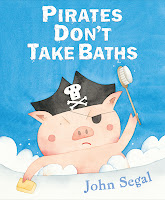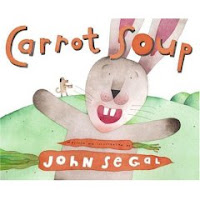On AICL, there's a page of "the foul among the good" that catalogs books in which Native people are stereotyped, objectified, and mocked in celebrated or popular children's books. Some of the images there are in old books that are still being published, and some are from newly published books. I've got another new one to add...
From there, kid-pig imagines him/herself (gender not specified) as "someone else." Here's the summary from the publisher's page:
For any young child (or pig), there are few things more excruciating, more traumatic, more torturous than bathtime. And this little pig is putting his hoof down. No. More. BATHS. But how can he possibly accomplish this? Well, by being someone else, of course. After all, everyone knows that pirates, astronauts, and knights in shining armor - just to name a few - never, EVER take baths. Now if only he can convince his mother . . .
In his hilarious new picture book that is sure to become an integral part of bathtime routines, John Segal documents one particular skirmish in this never-ending battle of wills.
With each "someone else" pig-kid comes up with, pig-parent counters with a reason why the "someone" won't work. For example, pig-parent tells pig-kid that pig-kid can't be a pirate, because pig-kid gets seasick. So, pig-kid moves on to another "someone."
Most of the suggestions pig-kid comes up with are things someone can choose to be.
Astronaut? A job one might choose... Knight in shining armor? Ditto. Cowboy? Again, a choice. Same thing for treasure hunter.
In the midst of all this someone-elsing is Eskimo.
Pig-kid says "I'm an Eskimo. They can't bathe. Its TOO COLD."
Pig-parent says "Yes, but do you know what Eskimos eat? Whale blubber and walrus liver." To which pig-kid says "Blubber and liver? That's gross."
Come on, John Segal! Eskimos--who prefer Inuit, Inupiaq and their own names for who they are--take baths. You're having fun at their expense, and you're contributing to misinformation about people who Americans know so little about!
I'm curious, Mr. Segal...
You've got kid-pig playing Cowboy on one page, but you don't have the usual playing Indian alongside it. I wonder why you didn't do that? I'd like to think you knew better, but the Eskimo page tells me otherwise. Playing Eskimo is just as bad as playing Indian.
And---what's up with making fun of food Alaska Natives eat?! As Erin (a librarian who works with Inupiaq children) writes in her review at Goodreads,
The Iñupiaq people practice a subsistence lifestyle that many people may regard as “gross” because it is unfamiliar. Bowhead whales are harvested and used to feed the entire community.
Erin writes that she's sending the book back to the publisher. I wonder if she included a letter stating why. I hope so! And, I wonder what would happen if ten people did that?
Segal's choice to make light of Alaska Natives backfires. For a thoughtful essay on humor, take a few minutes to read Uma Krishnaswami's article at Horn Book: "No Joke! Humor and Culture in Middle-Grade Books." Though her essay focuses on middle-grade books, her words apply to picture books, too.








You really don't think that the reaction would have been the same if the cowboy was eating rattlesnake or something. My students react with "Eeew" when I read a story about someone eating bugs. It's not part of our everyday culture here. I really don't think that's such a big deal.
Beverly Slapin asked me to post this comment on her behalf:
------------------
Dear Anonymous,
You’re right: the portrayal of cowboys eating rattlesnake meat would probably elicit “eeew” reactions. But “cowboy” is an occupation, and children do not automatically link “cowboy” with “rattlesnake” because cowboys are not portrayed as eating rattlesnake meat—or not bathing—as significant parts of their culture. On the other hand, “Eskimo” people belong to cultures with specific lands, languages and communities; and children’s book authors/illustrators continue to portray children “playing (stereotyped) Indian” or “playing (stereotyped) Eskimo.” Isn’t it time to stop justifying their actions?
--Beverly Slapin